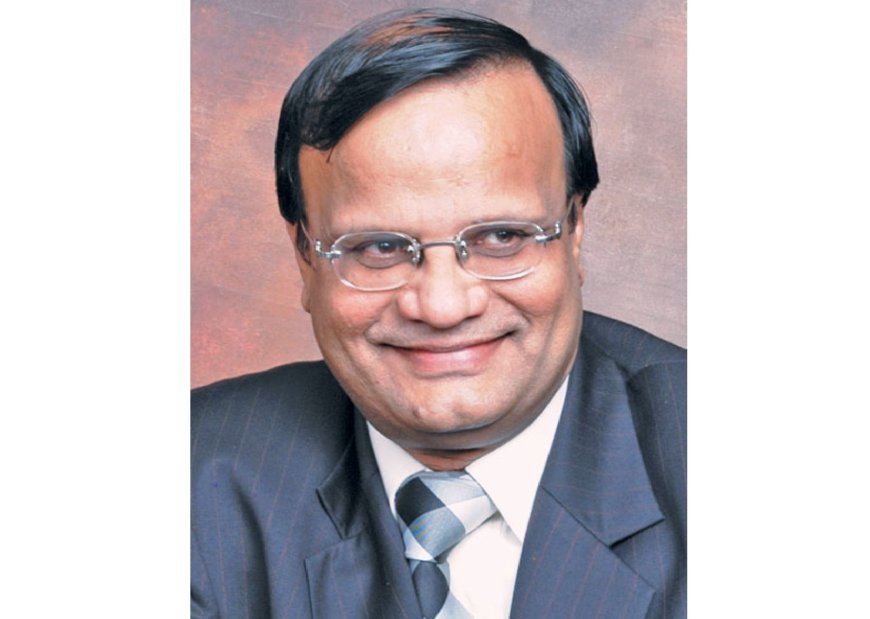Pumping System: Vital Water Infrastructure.
Anil Sethi, Chairman, Pump Academy How do you see the government’s ‘Make in India’ programme and its mission motivating construction and infrastructure industry to participate in it? How is this helping the construction and infrastructure sector to improve its technological

How do you see the government’s ‘Make in India’ programme and its mission motivating construction and infrastructure industry to participate in it? How is this helping the construction and infrastructure sector to improve its technological status and competitiveness in the global market?
The Hon’ble Prime Minister of India launched ‘Make in India’ programme in September 2014 that envisage transforming India into a global manufacturing hub with an aim to increasing the share of manufacturing in India’s GDP from 16% to 25% by 2022. The idea behind the initiative was to facilitate investment, foster innovation, enhance skill development, protect intellectual property & build world standard manufacturing infrastructure. Under the scheme, government intends to develop industrial corridors and smart cities to provide infrastructure based on state-of-the-art technology with modern high-speed communication and integrated logistic arrangements. It has also taken up to upgrade and strengthen the existing infrastructure in industrial clusters to support manufacturing facilities. Innovation and research activities are supported through fast paced registration system and accordingly infrastructure of Intellectual Property Rights registration set-up has been upgraded.
The construction and infrastructure industry is one of the key sectors that have been identified as a priority area under this initiative. The ‘Make in India’ programme enabled creating conducive environment for investment, develop modern infrastructure, and open up new sectors for foreign investment. It helped the construction and infrastructure sector to improve its technological status and competitiveness in the global market by providing incentives for companies to invest in research and development, promoting innovation, and encouraging the use of advanced technologies. The programme has also helped to create jobs and boost economic growth in the country.
Foreseeing the government’s strong commitment and stable sentiments in the market, how do you evaluate your company’s growth in the coming years in the water infrastructure sector?
Among all the natural resources necessary for propelling life on earth, water is the most important resource ensuring survival of human and economy. The water infrastructure in India is huge, but most of them are legacy units built decades ago on conventional methods. The Govt. of India is committed towards making clean water provision to every households in the country and launched a number of initiatives including much ambitious Jal Jeevan Mission with a planned spending of 6.47 trillion rupees. Some other major water projects underway in India across various states and cities are National River Conservation Plan, the National Rural Drinking Water Programme, and Atal Bhujal Yojana etc.
Pump Academy Private Limited is very hopeful of strong growth in Indian water market given the high quality technological solutions we are providing for making water pumping system smart and responsive in line with the technological needs for this vital water infrastructure. We are increasing our footprints with water utilities and making significant contributions to solve the most pressing challenges of our time, water scarcity by optimizing the pumping system and curbing significant water losses
What kind of projects is your company executing presently in India?
Pump Academy Private Limited has introduced a pioneering solution to optimize pumping station operations with the patented IoT enabled innovative system called iPUMPNET. This advanced system aims to improve the operations of pumping stations while enhancing energy efficiency thus making the pumps smart and responsive. It is currently executing projects for water utilities in India including a large project in Bengaluru to streamline pump station operations with real-time monitoring through an intuitive dashboard interface accessible via internet and mobile applications, along with other facilities.
How helpful is the innovative solution for water utilities that your company has been offering?
iPUMPNET is transforming existing pumping stations into more efficient infrastructure that could be used in various sectors such as water supply, wastewater treatment, power generation, irrigation, oil and gas, paper and pulp and other industries. It can improve pumping station operational efficiency upto 35%, reduce energy cost upto 40%, extend the life of pumping systems upto 50%, reduce the life cycle cost (LCC) of pumping stations upto 40% and practically eliminates unscheduled breakdowns and maintenance requirements among several other significant benefits.
It streamlines workflows and improves overall efficiency of pumping stations; provide access to legacy data, helps in functional reporting while providing control through centralized monitoring system thus helping authorities with deep insights and remote evaluation. It converts the dynamic performance of machines into running parameters by linking electrical, mechanical, and hydraulic factors. It also gathers real-time pump health data and issue alerts to predict and detect potential risks and pump failure. It is estimated that almost 5 GW of energy could be saved if iPUMPNET is implemented across all water pumping stations in India.
How is the scarcity of skilled workers affecting the prospects of the construction / infrastructure market?
The shortage of skilled workforce is a major challenge facing the construction and infrastructure sector in India. According to a report by the National Skill Development Corporation (NSDC), the construction sector in India is facing considerable shortage of skilled workers across various trades such as masonry, plumbing, mechanical and electrical works. This shortage of skilled workers can lead to delays in project completion, increased costs, and compromise with quality of work. Many large projects are delayed beyond the stipulated periods and according to the Ministry of Statistics and Programme Implementation, which monitors infrastructure projects worth Rs. 150 crore and above, 1449 projects are delayed by 1-60 months period. It has also reported that delay in 354 infrastructure projects shows cost overruns of more than Rs. 4.55 lakh crore from its original project cost. Among other factors for the delay, some of them could be attributed to the lack of skilled workforces as well.
Hits: 8








